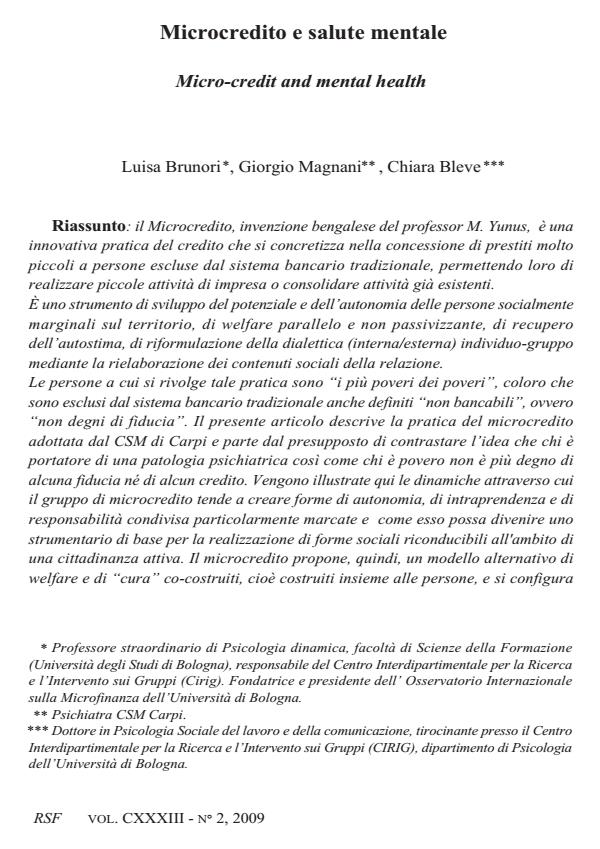Microcredito e salute mentale
Titolo Rivista RIVISTA SPERIMENTALE DI FRENIATRIA
Autori/Curatori Luisa Brunori, Giorgio Magnani, Chiara Bleve
Anno di pubblicazione 2009 Fascicolo 2009/2
Lingua Italiano Numero pagine 15 P. 127-141 Dimensione file 477 KB
DOI 10.3280/RSF2009-002007
Il DOI è il codice a barre della proprietà intellettuale: per saperne di più
clicca qui
Qui sotto puoi vedere in anteprima la prima pagina di questo articolo.
Se questo articolo ti interessa, lo puoi acquistare (e scaricare in formato pdf) seguendo le facili indicazioni per acquistare il download credit. Acquista Download Credits per scaricare questo Articolo in formato PDF

FrancoAngeli è membro della Publishers International Linking Association, Inc (PILA), associazione indipendente e non profit per facilitare (attraverso i servizi tecnologici implementati da CrossRef.org) l’accesso degli studiosi ai contenuti digitali nelle pubblicazioni professionali e scientifiche.
Micro-credit and mental health - Micro-credit, a Bengali invention of Professor Muhammad Yunus, is an innovative practice of credit, based on very small loans, given to people traditionally ignored by the banking system. These loans allow people to open small businesses or to support their current activities. Micro-credit is a tool that develops the potentials of marginal people and encourages autonomy. It represents a parallel welfare policy that holds back human passivity, supports self-recovery, and reprocesses the social dimension of relationship, the internal/external dialectic between individual and group. Micro-credit involves the "poorest of the poor", the people traditionally excluded from the banking system, because considered "not includable", or simply "not trustworthy" enough. This paper describes micro-credit practices, adopted by the mental health service of Carpi (a small town in northern Italy). The basic aim of this service is to counter the idea that people with psychiatric disorders, as the poor, are not worthy of trust, nor of receiving financial loans. Micro-credit enhances autonomy, initiative and shared responsibility. It is a basic tool of active citizenship. It represents an alternative model of welfare and of coconstructed care: a collaborative model built with different stakeholders. It is an important tool to keep in check public costs by promoting self-esteem and quality of life, by bringing people to become more autonomous and less dependent on services.
Parole Chiave: microcredito, fiducia, gruppo, gruppoanalisi, riabilitazione, beni relazionali, salute mentale.
Key Words: micro-credit, trust, group, group analysis, rehabilitation, relational goods, mental health.
Luisa Brunori, Giorgio Magnani, Chiara Bleve, Microcredito e salute mentale in "RIVISTA SPERIMENTALE DI FRENIATRIA" 2/2009, pp 127-141, DOI: 10.3280/RSF2009-002007